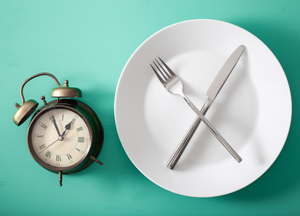You’re fasting, you’re focused — and now you’re holding a mug of coffee wondering, “Am I about to ruin everything?”
Fasting mistakes can be sneaky. Even that healthy morning cup you think is healthy might be working against your goals if you are focused on fasting. So let’s clear it up: Can you drink mushroom coffee while fasting without breaking your fast?
Spoiler: You probably can, but it depends.
In this article we’re getting into all of it — what fasting actually means, what really breaks a fast, how mushroom coffee fits into the picture, and what the science says about it all.
What is fasting — and why do people do it?
Fasting is the intentional practice of going without food or drink for a set period of time to allow the body to reset, repair, and rebalance. While some people fast for religious or cultural reasons, others do it for the growing list of science-backed health benefits.
Here’s why fasting has become so popular:
-
Mental clarity: Many people report sharper focus and improved mood during fasting windows, likely due to more stable blood sugar and reduced inflammation.
-
Fat-burning & weight management: Fasting helps reduce overall calories and encourages your body to shift from using quick-burning carbs (glucose) to using stored fat for energy.
-
Cellular repair (autophagy): Fasting triggers your body’s natural clean-up process, which breaks down damaged cells and may help you stay healthier, longer.
-
Improved insulin sensitivity: Taking breaks from eating can help regulate blood sugar and reduce insulin resistance.
-
Hormonal balance: Fasting can influence key hormones like human growth hormone (HGH), which supports fat burning and muscle maintenance.
What are the different ways to fast?
Not all fasting looks the same. Depending on your goals and lifestyle, there are several ways to approach it.
The most common types of intermittent and extended fasting are:

-
16:8: Eat all your meals within an 8-hour window, then fast for 16 hours. One of the most popular and sustainable methods.
-
18:6: Similar to 16:8, but with a shorter eating window and longer fasting period. THis is often used for more targeted results like deeper fat burning, improved insulin sensitivity, or supporting cellular repair.
-
5:2: Eat normally five days a week, and on the other two days, reduce your calorie intake by about 500 — 600 calories.
-
Alternate-day fasting: Rotate between eating days and fasting or very low-calorie days. This type of fast is often used for metabolic health or weight loss.
-
OMAD (one meal a day): A more extreme version of time-restricted eating where all daily calories are consumed in a single meal.
-
Extended fasts: Lasting 24 hours or longer. These are typically done less frequently and often with medical supervision or guidance.
The stricter the fast, the more even small ingredients (like a splash of milk or added sweeteners) might impact your results. Choosing what to consume during your fast depends on your specific goals.
What actually breaks a fast?

Not everything you consume will break your fast. It depends on why you're fasting. Your goals will determine how strict you need to be and what counts as “breaking” the fast.
Here’s a general breakdown of what can interfere or “break” your fast:
-
Anything over ~50 calories: For most people focused on weight loss or metabolic health, this is the rough cutoff where fasting benefits may start to fade.
-
Carbs and protein: These are the most likely to spike insulin and halt fat burning or cell repair especially if you consume more than 1-2 grams. Even small amounts make a difference if you’re aiming for a strict or “clean” fast.
-
Fat-only ingredients (like MCT oil): These don’t spike insulin much, but they do contain calories. If your goal is mental clarity, energy, or staying in ketosis, they’re usually fine. But if you’re fasting for insulin sensitivity or cellular repair, even those calories can be disruptive.
-
The “one gram rule”: If something has fewer than 1 gram of net carbs or protein, it’s unlikely to significantly disrupt your fast. That’s why plain black coffee (or mushroom coffee without additives) tends to be a safe choice.
So it’s not just about calories — it’s about how your body responds to what you consume. The more specific your fasting goals, the cleaner your fast needs to be.
Does mushroom coffee break a fast?
In most cases, no, mushroom coffee won’t break your fast as long as it’s free of sweeteners, creamers, or oils. So in most cases, yes, you can drink mushroom coffee while fasting.
Like black coffee, a typical serving of mushroom coffee contains:
-
fewer than 20 calories (in the case of Peak State, 0)
-
less than 1 gram of net carbs (in the case of Peak State, 0)
-
zero protein or added sugar
-
moderate amounts of caffeine
That makes it a great fit for most intermittent fasting goals — especially if you're focused on energy, mental clarity, metabolic support, or appetite control.
However, if you're fasting specifically for deep cellular repair, you may want to keep it extra clean or skip it altogether. Even small amounts of calories or bioactive compounds could interrupt those more advanced fasting benefits. As always, it comes down to your goals and how strict you want or need to be.
How mushroom coffee can support your fast
Fasting can sharpen your focus and help your body reset, but it also comes with cravings, dips in energy, and a bit of a mental tug-of-war. Mushroom coffee can help give you a clean, energy boost when you need it with less of jitters or crash - if you pick the right brand.
Here’s how it supports your fasting window:

-
Curb your cravings: The combo of caffeine and adaptogens may help reduce hunger, making it easier to stay in the zone (and out of the snack drawer).
-
Boost mental clarity: Mushroom coffee that contains lion's mane and adaptogens like reishi may lead to more clarity with fewer crashes. Lion’s mane is known for supporting nerve growth factor (NGF), which plays a role in focus, memory, and brain health.
-
Gentle, steady energy: With less caffeine than regular coffee, mushroom blends offer a smoother ride without jitters or crashes.
-
Stress support: Adaptogenic mushrooms like reishi help keep cortisol balanced so you’re not feeling edgy halfway through your fast.
-
Immune perks: Chaga and other functional mushrooms are loaded with antioxidants to help keep your immune system strong, but the extracts have very few calories.
- Gut-friendly: Some mushrooms act as prebiotics, which can support digestion and microbiome health even when your gut is in “rest” mode.
What’s the best mushroom coffee for fasting?

Not all mushroom coffee is created equal, especially if you're trying to maintain a clean fast. If you want all the beneficial ingredients without disrupting your fasting goals, here’s what to look for in a blend:
-
Zero or very low calories: Look at the back of the package and keep it under about 20 calories per serving to stay within most fasting-friendly guidelines.
-
No added sugars, creamers, or fillers: Added sugar and artificial sweetener can spike insulin or break your fast altogether, this includes sugar alternatives of any type.
-
Fruiting body mushroom extracts (not mycelium on grain): Fruiting bodies contain more of the beneficial compounds you’re looking for, making them more potent and effective.
-
Third-party tested: Look for transparency around ingredient sourcing, purity, and potency. Companies should tell you where their mushrooms come from and how they are grown. Same goes for the other ingredients.
-
Organic, sustainably sourced ingredients: Clean inputs make for a clean cup and a better impact on your body and the planet.
Choosing a high-quality mushroom coffee makes all the difference, especially if you're drinking it daily during your fasting window. It should support your goals, not sabotage them.
How to get the most out of mushroom coffee while fasting
Mushroom coffee can be very supportive during a fast if you avoid a few common pitfalls:

-
Skip the “healthy” creamers: Even a splash of oat milk or sweetened almond creamer can spike blood sugar and break your fast.
-
Check the label: Some blends sneak in sugar or flavorings that can throw off your goals. Look out for ingredients like coconut sugar, natural vanilla flavor, or sugar alcohols. Even small additions can break a fast or spike insulin.
-
Drink it strategically: Sip it during your fasting window to take advantage of its focus-boosting and appetite-curbing effects. Or use it as a gentle way to ease into your eating window. It’s light, easy on digestion, and can help prepare your body for your first meal.
-
Hydrate, hydrate, hydrate: Coffee is a diuretic, and fasting limits your fluid intake from food. Make sure you’re drinking plenty of water alongside your mushroom coffee to stay energized, focused, and feeling good throughout your fast.
Are there any side effects to drinking mushroom coffee while fasting?
For most people, mushroom coffee is well-tolerated and pairs well with fasting. But if you’re new to either, here are a few things to keep in mind:
-
Caffeine sensitivity: Even with less caffeine than regular coffee, it can still hit hard on an empty stomach. If you're prone to jitters or energy crashes, start with a smaller cup or opt for a lower-caffeine blend.
-
Digestive discomfort: Mushrooms like chaga and reishi contain chitin, a tough fiber that can be harder to digest, especially when you haven’t eaten.
-
Food allergies or sensitivities: As with any new supplement, check the label. Introduce functional mushrooms gradually and pay attention to how your body responds.
So, should you drink mushroom coffee while fasting?
If you’re fasting and looking for clean energy, better focus, and a bit more calm in your day, mushroom coffee can be a powerful (and tasty) ally. It’s low in calories (or has none at all), packed with natural health benefits, and often more forgiving on an empty stomach than conventional coffee.
That said, it’s not one-size-fits-all. If you're sensitive to caffeine or new to functional mushrooms, start with a small amount and see how your body responds.
The key is to choose a clean, high-quality blend that aligns with your goals. Whether you’re deep into a fasting lifestyle or just looking for a smarter sip, mushroom coffee might be the perfect fit for your routine.

Ready to pair mushroom coffee with your next fast? Take our BrewFinder quiz to find the blend that fits your goals. We can ship your match straight to your door!

